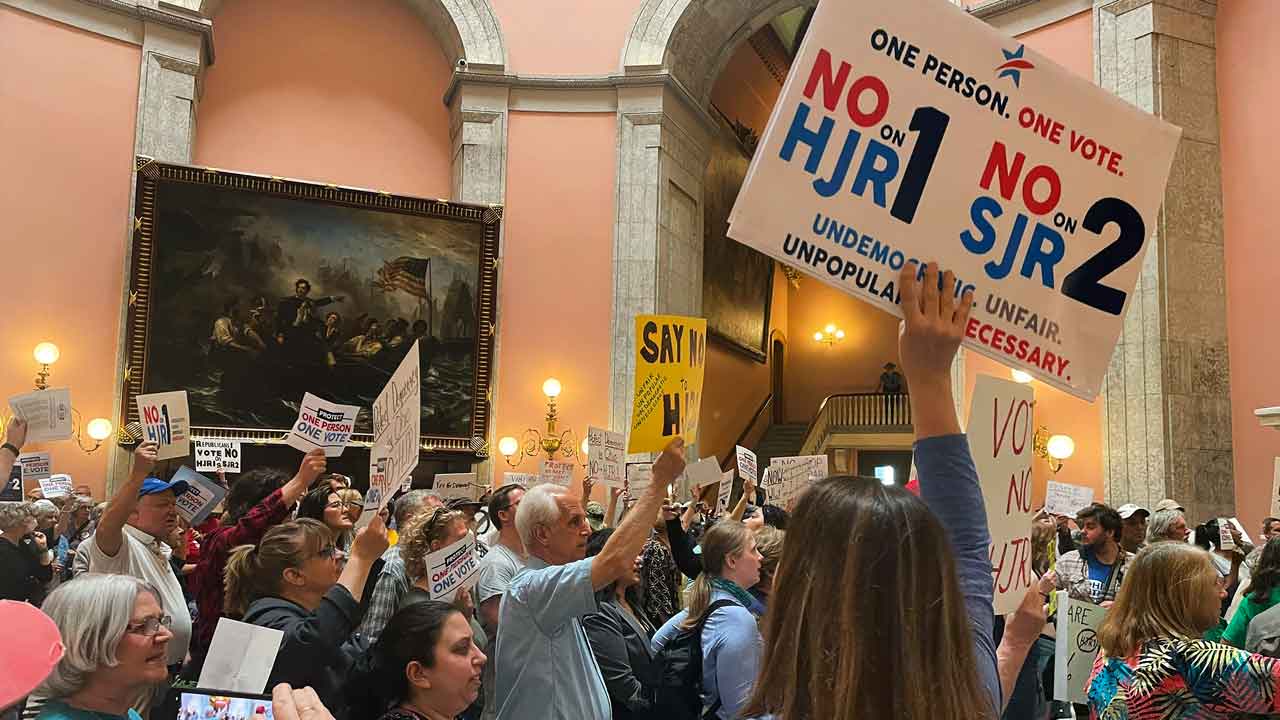Global Courant 2023-05-15 16:25:00
As other state legislators gathered around her in the Ohio House, Democratic State Representative Tavia Galonski stood up and began chanting loudly, “One person, one vote!”
The ex-Teamster’s shout quickly spread through the visitors’ gallery, then began to rise from the crowd of protesters gathered outside in the statehouse rotunda. The Republican speaker struggled to rise above the clamor and ordered the spectators to leave the room.
Last week’s striking scene came as Ohio joined a growing number of Republican states seeking to undermine direct democracy by limiting citizens’ ability to circumvent lawmakers through ballots and constitutional amendments.
Ohio’s proposal will ask voters in a special election in August to raise the threshold for passing constitutional amendments to 60% instead of a simple majority. It would also double the number of counties where signatures must be collected, adding an extra degree of difficulty to qualifying initiatives for the ballot.
The Missouri legislature failed to pass a similar measure on Friday, but Republicans pledged to bring the issue back in 2024 in an effort to prevent a citizen effort to restore abortion rights in the state through a constitutional amendment .
A similar measure will be on the ballot in North Dakota next year, while a measure in the works in Idaho would ask voters to increase signature requirements for petition collectors. In Wisconsin, where citizen initiatives are not allowed statewide, Republicans who control the legislature have proposed banning local governments from putting advisory questions on ballots. Such referenda are sometimes used to boost voter turnout, although the results do not carry the weight of the law. Florida Republicans added new hurdles to that state’s constitutional amendment process in 2020.
The trend has taken off as Democrats and left-wing groups frustrated with legislative gerrymandering keeping them out of power in state legislatures increasingly turn to the initiative process to force public votes on issues opposed by Republican lawmakers but popular with voters. Only about half of the states, mostly in the western US, allow some form of citizen voting.
REPUBLICANS IN OHIO PRESS TO RESTRICT AMENDMENTS TO STATE CONSTITUTION AS ABORTION RIGHTS REMAIN A QUESTION
In Ohio, voters have proposed using the initiative process to enshrine abortion rights in the state constitution in November, raise the minimum wage, legalize recreational marijuana and reform a redistribution system that has led to persistently unconstitutional political cards in favor of Republicans.
Arkansas Senator Bryan King, a Republican who has joined the League of Women Voters in a lawsuit against his state’s latest initiative restriction, said he views attempts to undermine the initiative process as anti-democratic.
A measure passed earlier this year by the GOP legislature in Arkansas and signed by Republican Governor Sarah Huckabee Sanders makes it more difficult to get initiatives on the ballot by increasing the number of counties where signatures must be collected from 15 to 50.
“I think one of the things it does is, regardless of which party is in power, when you start trying to make it harder for citizens to challenge what their government is doing or make changes, it just makes for people not to trust the process,” King said. “So I think it’s wrong to make it more difficult.”
In Ohio, former governors and attorneys general from both major parties have opposed the proposed constitutional amendment that would change the simple majority threshold for passing citizens’ initiatives that has been in effect since 1912.
Proponents and opponents of a Republican-backed measure to make it more difficult to amend Ohio’s Constitution gathered at the State House in Columbus, Ohio, on May 10, 2023. Ohio has joined a growing number of Republican-led states seeking to limit citizens’ ability to evade lawmakers through ballot initiatives. (AP Photo/Samantha Hendrickson, File)
Democratic lawmakers point to the bipartisan opposition and maneuvering that allowed the bill to make it to the vote in August as evidence that current Republicans are extremist in their desire to retain political power.
Republican state Representative Brian Stewart, the sponsor of the Ohio plan, argued during last week’s raucous floor session that a simple majority of voters will decide whether to impose the stricter requirements on future ballot initiatives.
“SJR 2 will ask Ohioans, not us, whether the Ohio Constitution should require a 60% voting threshold to pass amendments going forward. It will ask Ohioans, not us, to decide whether all 88 counties should have a vote in determining which amendments make it to the vote and to eliminate the cumbersome ‘healing’ period, which essentially gives own-initiative petitions a second chance if they fail to meet the requirements for entry to the vote,” he said. to Ohioans, that’s Democratic.”
What Stewart didn’t cover is how Republicans bypassed a law they just passed so they could put the proposed amendment on a summer ballot when turnout is typically quite low, instead of putting it before voters in the regular election in November.
OHIO GOV. MIKE DEWINE ANNOUNCES NEARLY $3 MILLION IN MENTAL HEALTH SUPPORT FOR THOSE AFFECTED BY TRAUMATIC EVENTS
Democratic Representative Casey Weinstein called out Stewart and Secretary of State Frank LaRose, a Republican, from Ohio for previously opposing the August special election they supported for offering the 60% question.
Weinstein read LaRose’s entire December testimony arguing for the provisions of a new law — signed in January — that scrapped most of August’s elections. LaRose argued that making big decisions, including those related to ballots, in chronically low turnout August elections “is not the way democracy is supposed to work” and that such elections “are not good for taxpayers, election officials or the public health. of our state.”
In testimony, Mark Gavin Sr., outreach director of the Black Environmental Leaders Association, referenced the number of enslaved people in the U.S. Constitution by calling Ohio’s proposal “the new three-fifths compromise.”
Gavin was one of hundreds of protesters who packed state House hearings and overflow rooms, testifying and marching against the Republican proposal, which he says is designed to weaken the power of individual voters.
“I’ve been a voter in Ohio for 15 years, and it’s getting really old to always have new rules and regulations on a ballot,” he said.
Anti-abortion and pro-gun groups were the main forces behind the push in favor of the proposed Ohio amendment. Since last year’s Supreme Court decision overturning Roe v. Wade, voters in Michigan, Kentucky and Kansas have protected abortion rights through statewide voting.
David Couch, an attorney who has worked on citizen initiatives in Arkansas, said Republicans’ attempts to thwart direct democracy are uniquely partisan.
“If you look at the history of Arkansas in the ’90s, when the Democrats controlled Arkansas, the conservative right passed same-sex marriage amendments, adoption amendments,” he said. “They’ve made all kinds of reforms and the Democrats haven’t tried to change the process.”
Democrats in Missouri tried to cripple the initiative process through legislation in 1992. then government. John Ashcroft, a Republican who later served as U.S. Attorney General, vetoed the bill. Ashcroft’s son, Jay, is the current Secretary of State.
CLICK HERE TO GET THE FOX NEWS APP
“It is through the initiative process that those who have no influence over elected representatives can take their cause directly to the people,” the elder Ashcroft said in a veto letter that became part of this year’s debate. “The General Assembly should therefore hesitate to enact legislation imposing impediments to the power of initiative contrary to the proviso in the Constitution.”
Missouri Republican legislators are singing a different tune today. Fearing a constitutional amendment to protect abortion rights, they pledged last week to make passing a ballot measure a priority in 2024 that would set a 57% threshold for passing future amendments.
Not all Republicans in the state think that’s a good idea. Former Republican House Speaker Pro Tem Carl Bearden said the proposal would infringe on the rights of Missouri voters, while noting that the initiative process is designed to check the power of the legislature.
“It’s not a conservative policy,” he said of the Republican plan.




